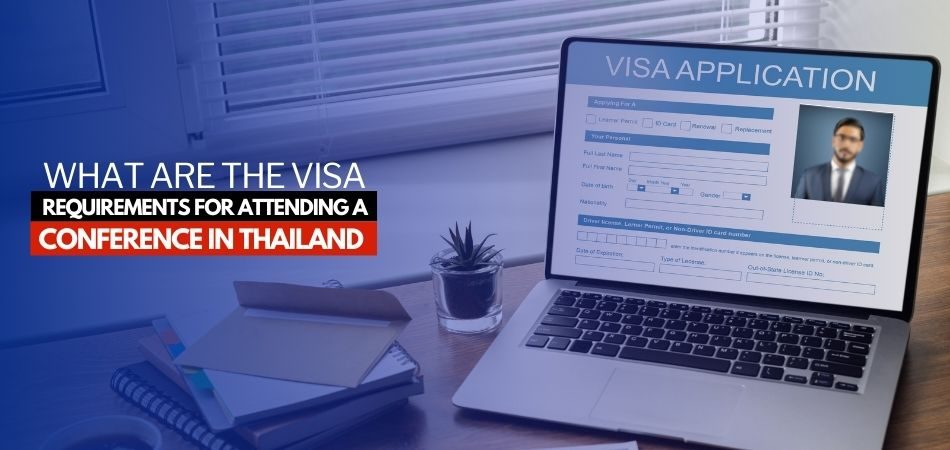Thailand has become a vibrant hub for international conferences, drawing professionals eager to network, learn, and explore a dynamic market. With its amazing blend of rich culture, warm hospitality, and bustling innovation, attending a conference in Thailand offers a truly memorable experience.
However, before you can dive into the event, you must address an important question: What are the visa requirements for attending a conference in Thailand?
Visa requirements vary by nationality, with options ranging from a Tourist Visa (allowing up to 60 days) and a Non-Immigrant Visa for business purposes (lasting 90 days) to a Visa on Arrival for shorter stays of 15 days, or even an E-Visa for 60-day visits.
If you’re looking to make your trip effortless, then read on to discover which visa type is most suitable for you.
Who Needs a Visa to Attend a Conference in Thailand?
Attending a conference in Thailand can be an exciting opportunity for professionals worldwide, but visa requirements vary depending on nationality and trip details. Here’s a breakdown to help you understand who needs a visa, why, and the best options available.

Visitors from Visa-Exempt Countries
Travelers from visa-exempt countries can attend conferences in Thailand without a pre-issued visa, simplifying the travel process. However, stays are typically capped at 30 days, allowing for short conference visits. These travelers can attend events, explore the culture, and leave before their exemption period expires. It’s wise to confirm your country’s visa exemption list since rules occasionally change.
Participants from Countries Eligible for Visa on Arrival
Citizens from select countries can opt for a Visa on Arrival, allowing a stay of up to 15 days. This option is great for short conferences and requires minimal paperwork, but it limits travel time. Applicants should have a valid return ticket and evidence of sufficient funds. Visa on Arrival saves time but may not suit longer events or extended stays.
Business Travelers Needing a Non-Immigrant Visa
For professionals attending business-focused conferences, the Non-Immigrant Visa is an ideal choice, permitting up to a 90-day stay. This visa is for attendees who need extra time to network, attend seminars, or schedule meetings. Applicants should secure official conference invitations and proof of business intent. This visa suits participants aiming for an in-depth experience in Thailand.
Tourists Attending Short Conferences on a Tourist Visa
A Tourist Visa, allowing up to 60 days, works for attendees combining leisure with a conference trip in Thailand. This option suits those who plan to explore after the conference, enjoying Thailand’s sights. Travelers should apply early and show necessary documents, like conference details and travel plans. This visa offers flexibility and enough time for both business and relaxation.
Thailand offers a range of visas suited to varying conference needs, from short, hassle-free options to extended stays. For those interested in upcoming conferences in Thailand, select the visa that best fits your conference duration, purpose, and personal travel plans for a smooth trip.
Why Do You Need a Visa to Attend a Conference in Thailand?
Attending a conference in Thailand opens doors to valuable learning and networking, but knowing the visa requirements is crucial. Securing the right visa lets you focus on maximizing your conference experience without legal or logistical hassles. Here’s why a visa is essential for conference attendees in Thailand.
Ensuring Legal Entry and Stay
A visa ensures your entry into Thailand aligns with immigration laws, preventing potential legal issues or entry refusals. It verifies your reason for visit, allowing for smooth transit through airport controls.
Proper documentation also reassures authorities of your intention to attend a business event. This step safeguards you against unplanned complications while traveling for professional purposes.
Avoiding Delays at Immigration
Having a visa in hand reduces wait times and questions during the immigration process, easing your entry. Immigration officers verify all travelers’ documents, and lacking a visa can cause complications and delays. A valid visa streamlines these checks, keeping you on schedule for conference events. This proactive step lets you focus on the conference rather than navigating entry hurdles.
Aligning with Conference Requirements
Some conferences may require international attendees to have proper visas for entry, especially for business-related events. A visa confirms your intent to participate in Thailand’s vibrant business events, meeting the organizer’s expectations. This requirement ensures participants are legally compliant with Thai immigration standards. Being prepared with a visa means you won’t miss out on key sessions or networking opportunities.
Allowing Flexibility for Extended Stays
A visa offers flexibility if you plan to extend your stay beyond the conference for sightseeing or business. It enables a longer visit, avoiding the need to leave abruptly due to visa expiration. For attendees wanting to explore Thailand’s attractions or attend post-conference meetings, a visa is essential. This option provides freedom to make the most of your time in Thailand.
What are the Visa Requirements for Attending a Conference in Thailand?
Attending a conference in Thailand requires knowledge of the visa requirements based on your nationality and intended duration of stay. Different types of visas are available for various needs, from short visits to longer business-related events. Here’s a closer look at the main visa options available for conference attendees.
Tourist Visa (TR)
The Tourist Visa is suitable for short-term conferences or events lasting up to 60 days. This visa can be extended for an additional 30 days if necessary. It’s ideal for attendees looking to participate in short workshops or networking events without the need for extensive business activities.
For those planning to use this visa, ensuring you have the necessary documentation is essential. This includes proof of accommodation, a return flight ticket, and possibly an invitation letter from the conference organizers. Applying for a Tourist Visa is a straightforward process that can facilitate your participation in the conference.
Non-Immigrant Visa (Category B)
A Non-Immigrant Visa (Category B) is designed for business-related purposes, including longer conferences or seminars. This visa permits stays of up to 90 days, with the possibility of extending your visit if required. It’s particularly beneficial for attendees involved in detailed discussions or presentations over several days.
To obtain this visa, you’ll need to provide documentation such as a conference invitation letter and proof of financial stability. Applying for this visa to attend a conference in Thailand typically requires more preparation than a Tourist Visa. The knowledge of the application process will help you avoid delays and ensure a successful trip.
Visa on Arrival (VOA)
For travelers from certain countries, the Visa on Arrival is an option for conferences lasting up to 15 days. This visa is granted upon arrival but requires the preparation of documents beforehand. Having your conference invitation and travel itinerary ready can expedite the process at the airport.
It’s crucial to check your eligibility for this visa option before traveling. Keep in mind that the Visa on Arrival is suitable for those attending shorter events without extensive business commitments. Ensure that your stay falls within the specified duration to avoid complications.
E-Visa
Some nationalities can apply online for an E-Visa, which allows attendance at conferences for up to 60 days. This application process is straightforward and can be completed from your home country. The E-Visa is convenient for those who prefer not to visit an embassy or consulate for visa processing.
When applying for an E-Visa, you may need to provide basic personal information and documentation. This includes an invitation letter and confirmation of your conference registration. Getting your E-Visa approved well in advance can help you focus on preparing for the conference itself.
How to Apply for a Visa for a Conference in Thailand?
Applying for a visa to attend a conference in Thailand involves several important steps to ensure a smooth process. Proper preparation can help you avoid any delays or complications. Follow this step-by-step guide to navigate the visa application process effectively.
Step 1: Determine Your Visa Type
Begin by identifying the appropriate visa type based on your nationality and the duration of your conference stay. Common options include the Tourist Visa for short events and the Non-Immigrant Visa for longer engagements. You will be able to choose the right visa for your needs if you understand the requirements for each one. Research specific visa categories on the official Thai immigration website for clarity.
Step 2: Gather Required Documents
Once you’ve selected your visa type, gather all necessary documents for the application. Typical documents include a valid passport, a completed application form, and an invitation letter from the conference organizers. Additional items may include travel itineraries and proof of accommodation arrangements. Ensure that all documents are accurate and up-to-date to avoid issues during processing.
Step 3: Complete the Application Form
Carefully fill out the visa application form, ensuring that all information is correct and matches the details in your documents. This form can often be found on the Thai embassy or consulate website relevant to your location. Double-check for any specific requirements, such as signatures or additional information needed. Accurate completion of the form is crucial for a smooth processing experience.
Step 4: Submit Your Application
After completing the application form and gathering your documents, submit them to the appropriate Thai embassy or consulate. Depending on your visa type, you may need to pay a processing fee at this time. Some applications can be submitted online, while others may require an in-person visit. Be prepared for potential wait times during peak application seasons.
Step 5: Wait for Processing
Once your application is submitted, wait for it to be processed. Processing times can vary based on the visa type and the volume of applications received. It’s advisable to apply well in advance of your conference to account for any delays. Monitor the status of your application through the embassy’s website or by contacting them directly.
Step 6: Receive Your Visa
After processing, you will be notified regarding the outcome of your visa application. If approved, your visa will be stamped in your passport, allowing you to attend the conference. Carefully review the visa details for accuracy, including the validity dates and duration of stay. If there are any discrepancies, contact the embassy or consulate immediately to resolve them.
What Can You Do With the Conference Visa in Thailand?
Obtaining a conference visa for Thailand opens up various opportunities during your stay. This visa allows you to engage in professional development, network with peers, and explore the local culture. Here’s a closer look at what you can do with a conference visa in Thailand.
- Attend Conference Sessions: The primary purpose of the conference visa is to allow participation in sessions, workshops, and presentations. Engaging in these activities enhances your knowledge and professional skills in your field of interest.
- Network with Professionals: This visa enables you to connect with industry leaders and fellow attendees. Building relationships during the conference can lead to valuable collaborations and future opportunities.
- Present Your Research: If you have relevant work or findings, you can present your research at the conference. Sharing your expertise with others allows for feedback and enhances your professional visibility.
- Engage in Networking Events: Many conferences host networking events designed for informal discussions and interactions. Participating in these gatherings is an excellent way to make meaningful connections in your industry.
- Explore the Local Culture: With a conference visa, you have the chance to explore Thailand’s rich culture and attractions. Many attendees take time to experience local cuisine, art, and historical sites during their visit.
- Extend Your Stay: If desired, you might have the option to extend visa to stay after attending a conference in Thailand. This allows for additional time to explore or conduct further business meetings, enhancing your overall experience.
Frequently Asked Questions
Being aware of the visa requirements for attending a conference in Thailand is crucial for a smooth experience. Many attendees have questions regarding specific aspects of the application process. Here are some frequently asked questions to help clarify your concerns.
Do I Need a Visa for a Short Conference?
Yes, depending on your nationality, you may need a visa even for short conferences. For attendees from certain countries, a Visa on Arrival or Tourist Visa may suffice for stays up to 15 or 60 days, respectively.
How Long Does It Take to Process a Visa?
Processing times can vary based on the type of visa and the consulate’s workload. Generally, it takes between 3 to 10 business days to process your application. Applying well in advance is advisable to avoid delays.
What Documents Are Required for Visa Application?
Commonly required documents include a valid passport, completed application form, conference invitation letter, and recent photographs. Some applications may also need proof of accommodation and a travel itinerary. Ensure all documents are accurate to facilitate processing.
Can I Change My Visa Type After Arrival?
Changing your visa type after arrival in Thailand can be complicated and is generally not recommended. It’s best to apply for the correct visa type before travel. Consult with local immigration authorities if you need to change your status.
Is Travel Insurance Necessary for Visa Application?
While travel insurance is not always mandatory for visa applications, it is highly recommended. Having travel insurance protects you against unexpected events during your trip. Some embassies may require proof of insurance for specific visa types.
What Should I Do If My Visa Application Is Denied?
If your visa application is denied, you can typically appeal the decision or reapply. Carefully review the reasons for denial and address any issues in your new application. Consulting the embassy for guidance on the appeal process is advisable.
End Note
Attending a conference in Thailand presents a great opportunity for professional growth and cultural exploration. Before starting on your journey, make sure you know what are the visa requirements for attending a conference in Thailand.
By choosing the appropriate visa type and gathering the necessary documentation, you can ensure a smooth and enjoyable experience. This preparation allows you to focus on networking and learning without the stress of visa complications.
Take advantage of the chance to engage with industry leaders and immerse yourself in Thailand’s vibrant culture during your visit!







